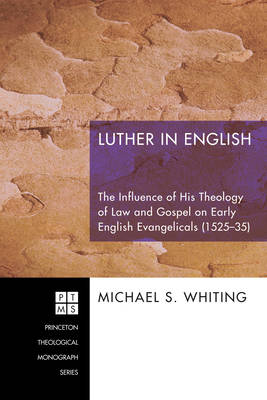
Bedankt voor het vertrouwen het afgelopen jaar! Om jou te bedanken bieden we GRATIS verzending (in België) aan op alles gedurende de hele maand januari.
- Afhalen na 1 uur in een winkel met voorraad
- In januari gratis thuislevering in België
- Ruim aanbod met 7 miljoen producten
Bedankt voor het vertrouwen het afgelopen jaar! Om jou te bedanken bieden we GRATIS verzending (in België) aan op alles gedurende de hele maand januari.
- Afhalen na 1 uur in een winkel met voorraad
- In januari gratis thuislevering in België
- Ruim aanbod met 7 miljoen producten
Zoeken
Luther in English
The Influence of His Theology of Law and Gospel on Early English Evangelicals (1525-35)
Michael S Whiting
€ 103,45
+ 206 punten
Uitvoering
Omschrijving
Recent studies have increasingly downplayed, and in a few cases even wholly denied, the influence of Martin Luther's theology of Law and Gospel on early English evangelicals such as William Tyndale. The impact of a late medieval Augustinian renaissance, Erasmian Humanism, the Reformed tradition, and Lollardy have all but eclipsed the more central role once attributed to Luther. Whiting reexamines these claims with a thorough reevaluation of Luther's theology of Law and Gospel in its historical context spanning twenty-five years, something entirely lacking in all previous studies. Based on extensive research in the primary sources, with acute attention to the larger historical narrative and in dialogue with secondary scholarship, Whiting argues that scholars have often oversimplified Luther's theology of Law and Gospel and have thus wrongly diminished his very significant, even principal, influence upon first-generation evangelicals William Tyndale, John Frith, and Robert Barnes during the English Reformation of the 1520s and 30s.
Specificaties
Betrokkenen
- Auteur(s):
- Uitgeverij:
Inhoud
- Aantal bladzijden:
- 378
- Taal:
- Engels
- Reeks:
- Reeksnummer:
- nr. 142
Eigenschappen
- Productcode (EAN):
- 9781498254366
- Verschijningsdatum:
- 1/06/2010
- Uitvoering:
- Hardcover
- Formaat:
- Genaaid
- Afmetingen:
- 152 mm x 229 mm
- Gewicht:
- 675 g

Alleen bij Standaard Boekhandel
+ 206 punten op je klantenkaart van Standaard Boekhandel
Beoordelingen
We publiceren alleen reviews die voldoen aan de voorwaarden voor reviews. Bekijk onze voorwaarden voor reviews.









